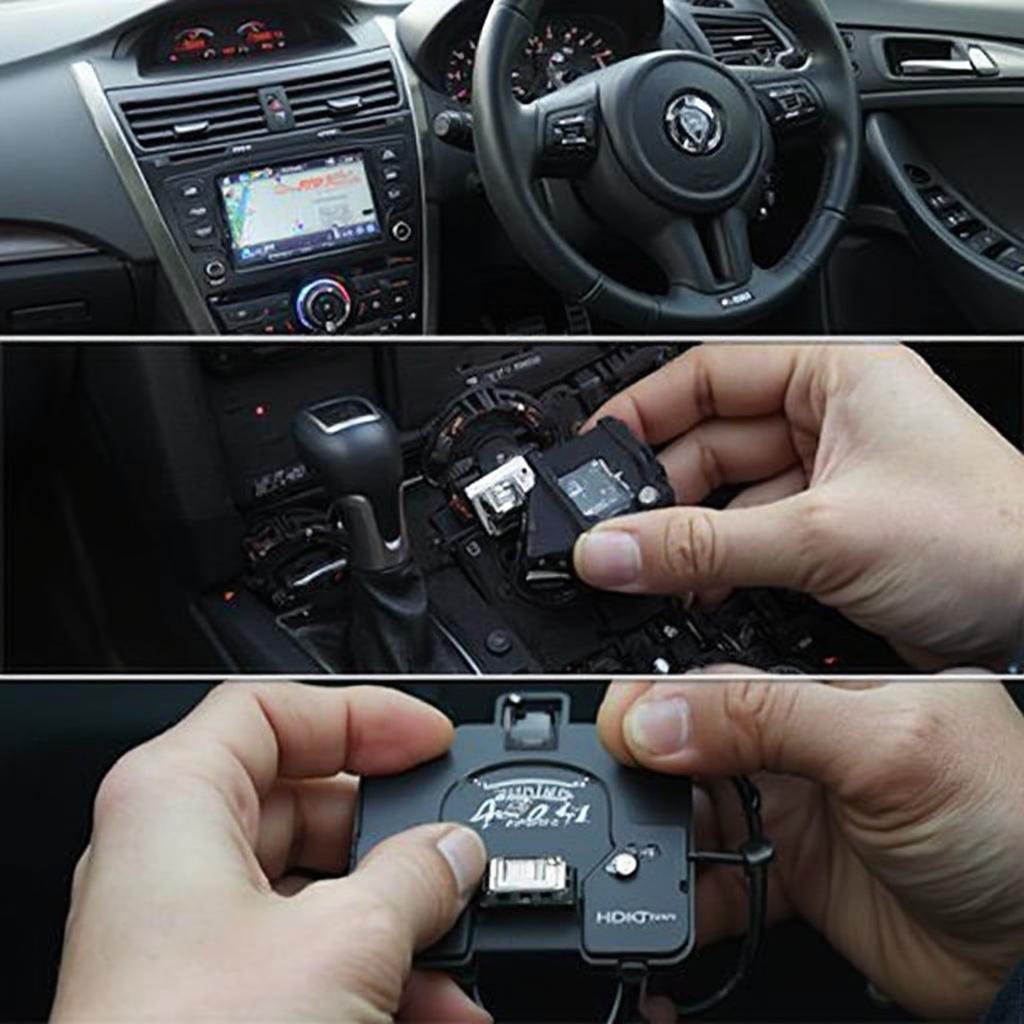Eco OBD2 tuning chips promise increased fuel efficiency and performance with a simple plug-and-play installation. But do they deliver on these claims? Many drivers are skeptical, wondering if these devices are too good to be true. This article delves into the technology behind eco OBD2 tuning chips, examining their potential benefits, drawbacks, and exploring whether they’re a worthwhile investment for your vehicle.
Understanding Eco OBD2 Tuning Chips
Eco OBD2 tuning chips are marketed as devices that optimize your car’s engine control unit (ECU) to improve fuel economy and performance. They plug directly into your vehicle’s OBD2 port, typically located under the dashboard. The chip supposedly analyzes your driving habits and adjusts the ECU’s parameters accordingly. Manufacturers claim improvements in fuel efficiency of up to 15-25% and noticeable gains in horsepower and torque. However, these figures are often debated, and the actual impact can vary significantly depending on the vehicle, driving style, and the specific chip used. The idea is enticing: a simple, affordable upgrade that can save you money at the pump and boost your car’s performance. But before you rush to purchase one, it’s crucial to understand how they claim to work and whether the science backs up the marketing hype.
After installing the chip, it supposedly learns your driving habits over a period of 150-200 km. This learning phase allows the chip to gather data about your throttle inputs, gear changes, and other driving parameters. The chip then uses this information to adjust various ECU settings, such as fuel injection timing and air-fuel ratio, with the goal of achieving optimal performance and fuel economy. Sounds simple, right? Well, the reality is a bit more complicated.
Separating Fact from Fiction: Do Eco OBD2 Chips Actually Function?
The effectiveness of eco OBD2 tuning chips is a subject of considerable debate among car enthusiasts and experts. While some users report noticeable improvements in fuel economy, others claim to see no difference or even a decrease in performance. It’s important to approach these claims with a healthy dose of skepticism. Many factors influence a vehicle’s fuel efficiency, including driving style, road conditions, and vehicle maintenance. Isolating the impact of an eco OBD2 chip can be challenging.
Furthermore, the claims made by some manufacturers regarding substantial fuel economy gains are often exaggerated. Modern car ECUs are highly sophisticated and already optimized for efficiency. The potential for significant improvement through a simple plug-and-play device is limited. In fact, some argue that these chips are essentially placebos, offering no real benefit beyond the psychological effect of believing they’re working.
Considering a Nitro OBD2 performance tuning chip? Explore its features and benefits. You might also be interested in the Super OBD2 tuning chip.
The Potential Risks of Using Eco OBD2 Tuning Chips
While the potential benefits of eco OBD2 tuning chips are often overstated, the risks are often overlooked. One of the primary concerns is the potential for voiding your vehicle’s warranty. Modifying the ECU, even with a seemingly harmless device like an eco OBD2 chip, can be grounds for warranty denial if a related problem arises.
Another risk is the potential for damage to the ECU or other engine components. A poorly designed or malfunctioning chip can disrupt the delicate balance of the engine’s control systems, leading to performance issues, increased emissions, or even engine damage.
“It’s crucial to remember that the OBD2 port is primarily designed for diagnostics, not performance tuning,” says automotive engineer John Smith, from Automotive Systems Inc. “While some legitimate tuning tools utilize this port, eco OBD2 chips often lack the sophistication and precision required for safe and effective engine modifications.”
Exploring Alternatives to Eco OBD2 Tuning Chips
If you’re looking to improve your vehicle’s fuel economy and performance, there are more effective and reliable alternatives to eco OBD2 tuning chips. Regular vehicle maintenance, such as ensuring proper tire pressure and using the correct grade of motor oil, can significantly impact fuel efficiency.
Adopting fuel-efficient driving habits, such as avoiding rapid acceleration and braking, can also make a noticeable difference. For more substantial performance gains, consider professional ECU remapping or other reputable performance upgrades. These methods are typically more expensive but offer more predictable and reliable results.
“Investing in proven methods like regular maintenance and driver training can yield far greater benefits in the long run than relying on questionable quick fixes like eco OBD2 chips,” advises automotive consultant Maria Garcia, of Green Auto Solutions.
Conclusion: Are Eco OBD2 Chips Worth It?
While the allure of a simple, inexpensive performance and fuel economy boost is tempting, eco OBD2 tuning chips often fail to deliver on their promises. The limited potential for improvement, combined with the potential risks and the availability of more effective alternatives, makes these chips a questionable investment. Instead of relying on questionable quick fixes, focus on proven methods like regular maintenance, fuel-efficient driving habits, and consulting with reputable automotive professionals for performance upgrades. These strategies will provide more reliable and sustainable results in the long run.
FAQ
-
What is an eco OBD2 tuning chip? A device marketed to improve fuel efficiency and performance by modifying the ECU’s parameters.
-
How does it work? It plugs into the OBD2 port and supposedly adjusts the ECU based on driving habits.
-
Does it really work? Evidence is inconclusive, with many reports of negligible or no improvement.
-
Is it safe? It carries potential risks, including voiding your warranty and causing engine damage.
-
Are there better alternatives? Yes, regular maintenance, fuel-efficient driving, and professional tuning are more reliable.
-
How much do they cost? Prices vary, but they are generally inexpensive.
-
Where can I buy one? They are available online and from some auto parts retailers.
Common Scenarios and Questions
Scenario: My car is getting poor gas mileage. Will an eco OBD2 chip help?
Answer: While the chip claims to improve fuel efficiency, it’s unlikely to be a significant solution. Focus on regular maintenance and driving habits first.
Scenario: I want to increase my car’s horsepower. Is this chip a good option?
Answer: No, eco OBD2 tuning chips are not designed for substantial horsepower gains. Consider professional tuning instead.
Further Reading and Related Topics
For more information on performance tuning, check out our articles on nitro obd2 performance tuning chip and super obd2 tuning chip.
Need further assistance? Contact us via WhatsApp: +1(641)206-8880, or Email: [email protected]. Our 24/7 customer support team is ready to help.


